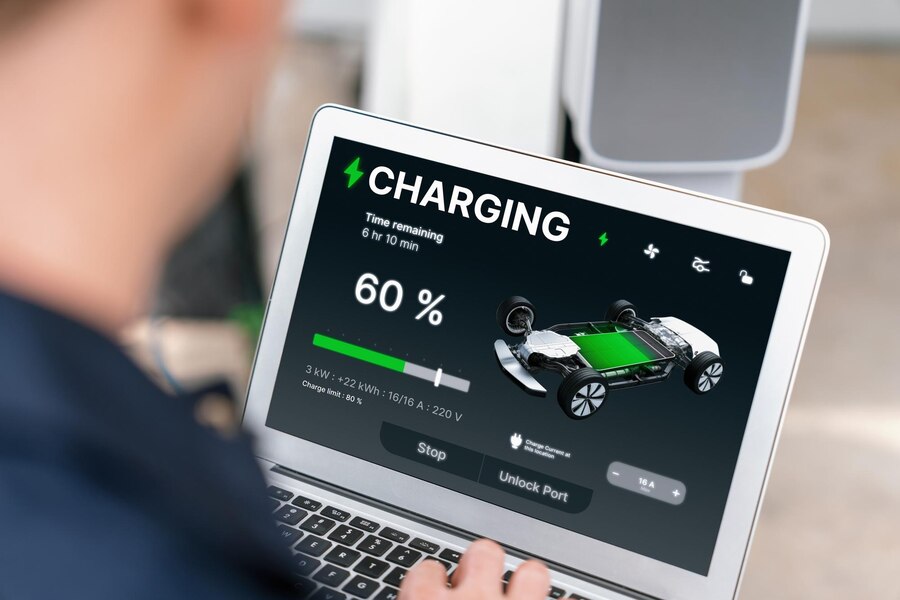Comprehensive Guide to Car Battery Charging Time: Everything You Need to Know

Car Battery Charging Time is more than just a question of convenience—it’s essential for your car’s performance, reliability, and safety. Whether you’re a new car owner or have been driving for years, understanding how long to charge your car battery can help you avoid the inconvenience of sudden breakdowns and costly replacements. Misconceptions about how batteries charge, such as the idea that “driving will fully charge it,” can lead to an undercharged battery that leaves you stranded.
In this detailed guide, we’ll explore car battery charging duration by breaking down factors that affect charging time, the best ways to charge depending on your battery type, and how to recognize when your battery might need replacing rather than just recharging. Plus, we’ll answer eight commonly asked questions to address all your concerns. Whether you’re looking for a quick charging car battery solution or need to learn more about battery maintenance, this guide has you covered.
How Car Batteries Get Charged
What is a Car Battery and Its Role in Your Vehicle?
The car battery is your vehicle’s primary power source for starting the engine and operating electronics. Without it, your car wouldn’t be able to start or power essential systems like lights, dashboard displays, or your entertainment system. Understanding car battery charging time is vital as it helps ensure that your battery remains healthy and can consistently supply power. Proper maintenance can lead to significant savings on replacements and reduce the risk of unexpected breakdowns.
How Does a Car Battery Charge?
Your vehicle’s alternator recharges the battery while you drive, converting the car’s mechanical energy into electrical energy. This system is designed to maintain the battery’s charge rather than fully recharge it from a low level. Time to recharge car battery through alternator power alone can be considerable, especially if the battery is deeply discharged.
A fully depleted battery benefits more from an external charger than from alternator-based charging alone. So, while driving is a good way to keep your battery topped up, it’s not ideal for recharging a completely drained battery.
Why Understanding Charging Time Matters
Knowing the car battery charging time can help you avoid common pitfalls, like relying solely on driving to recharge a weak battery. Additionally, understanding how long to charge car battery with an external charger can help maximize performance and lifespan. Proper charging methods, based on the battery’s state and your specific needs, will help keep your car battery functional and reliable.
Factors Affecting Car Battery Charging Time
Types of Car Batteries
- SLI (Starting, Lighting, Ignition) Batteries: These are standard car batteries, responsible for starting the engine and powering basic functions. Car battery charging duration for SLI batteries can vary, especially if charging through an alternator alone, which provides a slow recharge at best.
- EV (Electric Vehicle) Batteries: EV batteries differ significantly from SLI batteries and rely entirely on external chargers. Charging times can range from 30 minutes (rapid chargers) to over 12 hours with standard home chargers. These batteries require specialized charging stations due to their size and power requirements.
Depth of Discharge (DoD)
The Depth of Discharge (DoD) represents how much the battery has been depleted before recharging. A heavily discharged battery will require more time to recharge than one with a moderate depletion level. High DoD can also contribute to a longer car battery charging time because the battery needs more energy input to reach full capacity.
Methods of Charging
- Alternator Charging: This method maintains the battery’s charge during driving. However, it’s not an efficient method for a full recharge if the battery is low. Quick charging a car battery by alternator alone is rarely possible, especially if not driving at highway speeds.
- External Chargers: These are available at various amp levels. Higher amps allow faster charging but can cause overheating if used frequently on the same battery. Choosing the right amp level for your specific needs impacts both speed and the overall health of the battery.
Environmental Factors
Extreme weather conditions—hot or cold—can significantly affect the car battery charging time. For instance, heat can lead to fluid loss within the battery, reducing its effectiveness, while cold can thicken fluids, making it harder for the battery to charge efficiently. Always consider these factors when determining the time to recharge car battery.
How Long Does It Really Take to Charge a Car Battery?
| Charger Amp Level | Charging Time for 48-amp Battery | Recommended Use |
| 2 Amps | Approx. 24 hours | Ideal for long-term maintenance or trickle charging |
| 6 Amps | Approx. 8 hours | Suitable for moderate-speed charging |
| 10 Amps | Approx. 5 hours | Faster charging with minimal impact |
| 20 Amps | Approx. 2.5 hours | Quick charging but may reduce battery life if overused |
| 50 Amps | Approx. 1 hour | Emergency fast charge only |
This table provides a guideline for how long each amp level takes to recharge a typical car battery. Lower amp levels offer a safer, slower charge, ideal for maximizing battery lifespan, while higher amps are better for fast, occasional charging when you’re short on time.
Driving to Charge – How Far Do You Really Need to Drive?
When using the alternator alone, the car battery charging time may require hours of continuous driving. For example, highway driving for 8 hours may only charge a battery up to 75-80% of its full capacity. Quick charging car battery by driving should be seen more as a maintenance strategy than a reliable charging solution.
To maximize charging while driving, aim for highway speeds, conserve battery power (by reducing use of electronics), and avoid unnecessary stops.
Signs Your Battery May Need Replacement Instead of Charging
Warning Signs of a Weak Battery
- Difficulty Starting: If your car struggles to start, especially in the morning, the battery may be weakening.
- Frequent Jump-Starts: Requiring multiple jump-starts could mean the battery no longer holds a charge effectively.
- Reduced Power to Electronics: Dim headlights or slow window operation may indicate that the battery is weakening and failing to distribute power efficiently.
When to Choose Replacement Over Recharging
If your battery cannot retain charge even after several recharges, or if you find a quick drop in car battery charging duration post-charge, it’s likely time for a replacement. Regularly checking your battery’s charge level and performance can help prevent the sudden need for a replacement.
Tips for Efficient Battery Charging and Maintenance
Optimize Your Charging Time
- Drive at Highway Speeds: Alternators are more effective at highway speeds, where they can produce extra amperage to help charge the battery.
- Minimize Electronic Use: Conserve energy by turning off non-essential electronics like the radio, air conditioning, and phone chargers. This helps the alternator focus on recharging the battery.
Prolonging Battery Life
Routine maintenance can significantly extend car battery charging duration. For cars that sit unused for extended periods, a trickle charger can help maintain charge without overworking the battery. Regular checks on the battery’s charge level and state can help detect issues early, preventing major problems.
Conclusion
Understanding the car battery charging time can greatly impact your vehicle’s reliability and your peace of mind. By knowing the optimal charging methods and the time each requires, you can keep your car running smoothly and reduce battery-related issues.
CTA: Get Reliable Battery Services with KwikFix Auto
For trustworthy battery solutions, including battery replacements, on-site jump-starts, and emergency support, contact KwikFix Auto. Conveniently located in Mumbai, KwikFix Auto provides quality car services with transparent pricing. Call +91 9950 345 345 for fast service or download the KwikFix Auto app for assistance at your location within 60 minutes.
Frequently Asked Questions
Q1. How long does it take to charge a car battery while driving?
A1. If driving at highway speeds, it may take around 8 hours to charge a weak battery up to 80%.
Q2. Can I charge my car battery overnight with a 2-amp charger?
A2. Yes, a 2-amp charger can safely recharge your battery in about 24 hours, which is ideal for maintenance charging.
Q3. What is the fastest way to charge a car battery?
A3. A 50-amp charger can provide a quick boost within an hour, but should be used sparingly as high-amp charging can impact battery health.
Q4. Is it bad to frequently charge my battery at high amps?
A4. Yes, high-amp charging generates heat and may reduce the battery’s lifespan if done frequently.
Q5. Can extreme weather affect charging time?
A5. Absolutely. Hot and cold weather can hinder battery efficiency, slowing down charging.
Q6. How do I know if my car battery needs replacement?
A6. Signs like difficulty starting, frequent jump-starts, and reduced capacity usually indicate a need for replacement.
Q7. Can I use my alternator as the primary charger for my car battery?
A7. The alternator maintains but doesn’t fully recharge a weak battery. For a full charge, an external charger is recommended.
Q8. How can I check my battery’s charge level?
A8. Use a multimeter to check the voltage; a fully charged battery should read around 12.6 volts.
Related Articles
Car AC Gas Filling Cost | Electric Car Battery Capacity | How Car AC Works | How to Clean Car AC Filter | Car AC Repair Cost | AC Chair Car vs Executive Chair Car | Which Gas is Used in Car AC | Does AC in Car Consume Fuel | Why My Car AC is Not Cooling | Xylo Car Mileage with AC





